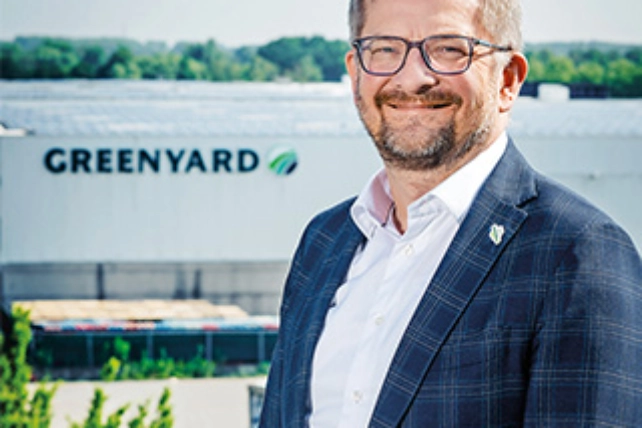

“During AY 24/25 our industry faced challenging climatological and market conditions. Despite the impact of reduced consumer confidence and spending, especially in the Long Fresh segment we note an increase in our volumes – like-for-like-sales grew with 5,1% to € 5,3 billion. The combination of volume and margin pressure in the Long Fresh Segment and increased costs due to the quality of produce resulted in a decrease of the Adjusted EBITDA with 1,9% to € 183,0m. Our results were also impacted by non-recurring items, higher depreciations and taxes and a lower financial result, resulting in a bottom line of € -2,9m.”
Climate change has been affecting our business for many years, decades even, as our growers experience the adverse effects of increasingly extreme weather conditions first hand. Last year was no exception. The situation in our markets proved to be equally challenging, with shifts in consumer spending and ongoing fierce competition in the retail market.
Looking at our performance at the level of our segments, we see very different dynamics at work. Our Fresh segment recorded strong growth, with like-for-like sales increasing with 5,9% to € 4,3bn. Our integrated partnerships continue to bear fruit, as we continue to grow strongly even in our longest partnerships, proving our business model has lost none of its power. Adjusted EBITDA margin in the Fresh segment decreased slightly to 2,2%, due to extra labour costs as a result of the quality of produce and continued price pressure, especially in the German market.
Growth was less strong in our Long Fresh segment (like-for-like +1,7%), although we did surpass € 1 bn in sales for the first time in our company’s history. The weakening of consumer demand in the second half of AY 24/25 had a clear effect on volumes in the same period for both the Frozen and the Prepared division. Adjusted EBITDA fell with 5,4% to € 84,4m due to higher operating costs. Unfavourable weather conditions during harvesting required extra handling and sourcing efforts to ensure quality and volumes remained at the same level.
The decreased volumes were mainly in traditional products, but the more innovative convenience solutions continued to grow. This was especially apparent in our Prepared division, where we saw a market-wide decline in canned fruit and vegetables in the second half of our accounting year. These lower sales were largely offset by a strong demand for our convenience products, with double-digit growth in some categories, displaying the importance of our efforts in product innovation.
Our Net result was further impacted by non-recurring restructuring costs due to the closing of our Fresh entity in France and the streamlining of operations in Germany. Although these can be considered as one-off restructuring costs, we still expect some additional costs from our streamlining operation in Germany, in AY 25/26.
Thanks to the strong free cash flow improvement of € 37m – by improving our working capital – we were able to reduce our Net Financial Debt to € 256,5m despite increased inventory in Long Fresh (€ 48,4m) and the acquisition of Crème de la Crème earlier this year. The leverage ratio also further decreased to 1,86x.
In AY 24/25 we renegotiated our factoring contracts and reduced our financial costs. We also saw the continuation of our CAPEX investment plans to increase the capacity of our infrastructure, improve the efficiency of our operations and support our product innovation. Bakker Barendrecht has started construction of a new high-bay warehouse in the Netherlands to fulfil its long-standing partnership with one of the largest Dutch retailers in the coming decades. At Greenyard Prepared, the new Tetra Pak line opens new opportunities for product innovation in the ambient market. In the Frozen division, we expanded our spinach lines in Comines, France and commissioned a new engine room in the United Kingdom. Meanwhile, we further expanded our capacity in renewable energy and started the implementation of a new ERP system in the Fresh division.
Finally, we continued to make progress in our new product development efforts, despite declining consumer confidence. Demand for convenient and innovative pure-plant solutions continues to grow. Investing in product innovation, both as a private label partner and through the development of our own brands, enables us to tap into this potential and strengthen our position in both existing and new categories.
We remain focused on efficiency, innovations, and sustainability to meet evolving market demands and support our partners. With a solid strategy in place and continued investment in capabilities and infrastructure, we look forward to living up to our mission to increase the consumption of fruit and vegetables in the years to come.